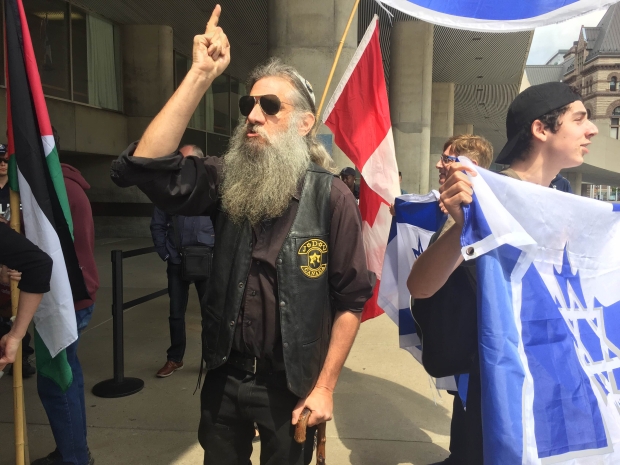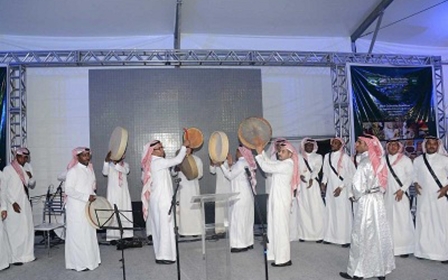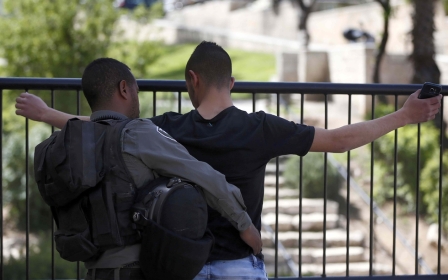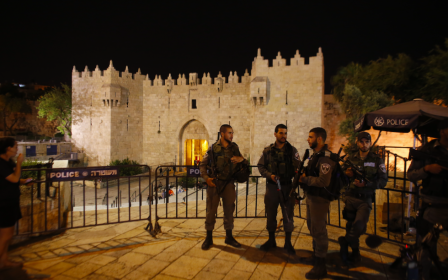Toronto under pressure to cancel speech at Jerusalem conference
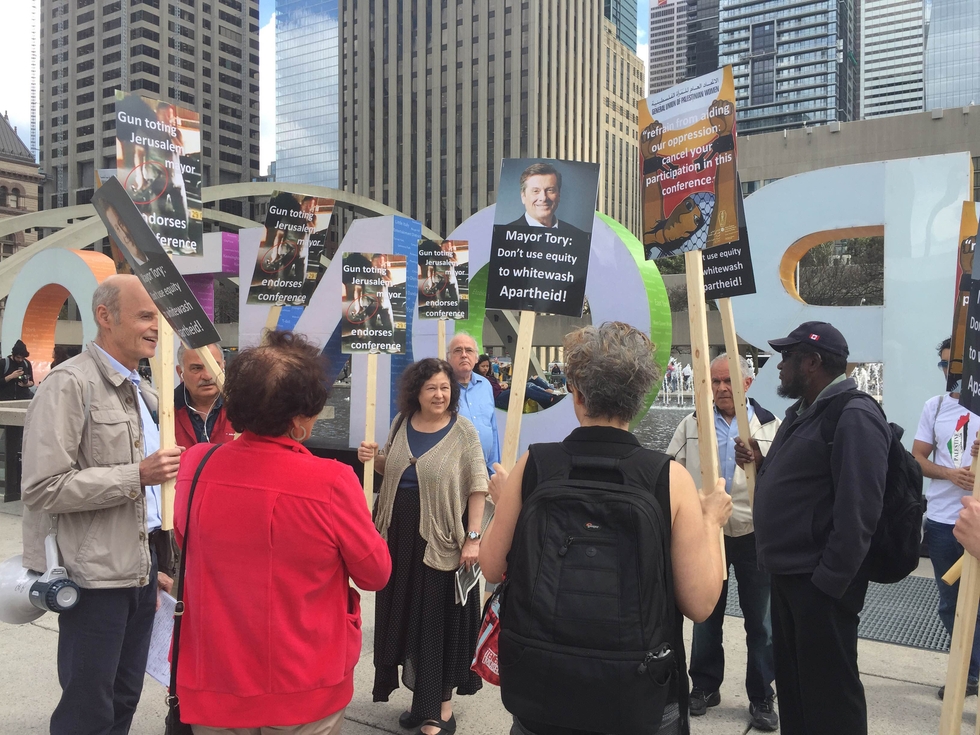
TORONTO, Canada – Toronto is facing criticism both at home and abroad as a city official is slated to give the keynote speech at a conference in Jerusalem that Palestinians say “aims to whitewash” life under Israeli occupation.
Uzma Shakir, director of Toronto’s Office of Equity, Diversity and Human Rights, is scheduled to host the first session at the “Jerusalem as a Culturally Competent City” conference, taking place at the Jerusalem Cinematheque on 17 May.
“It’s appalling that [Toronto] Mayor John Tory has allowed the city of Toronto to participate and, in fact, even more appalling that it’s doing that participation through the Office of Equity, Diversity and Human Rights,” said Mary-Jo Nadeau, a member of the Coalition Against Israeli Apartheid (CAIA), a Toronto-based group that is circulating a petition calling on the city to cancel the speech.
By Friday afternoon, the petition had garnered nearly 500 signatures. CAIA organised a small rally on Friday afternoon in front of Toronto city hall.
The protest was met by a handful of pro-Israel activists carrying Israeli flags and the flag of the Kach party, an extremist, right-wing group founded by the late hardline rabbi Meir Kahane that Israel, Canada and the US have deemed a terrorist organisation.
Nadeau said the call to boycott the conference is in line with the Palestinian-led Boycott, Divestment and Sanctions (BDS) movement. BDS is a non-violent movement that aims to hold Israel accountable under international law for its occupation of the Palestinian territories and discrimination against Palestinian citizens of the state.
“The boycott call of 2005 is explicitly anti-racism, it’s explicitly anti-apartheid, and that’s the call that we’re heeding and that’s the kind of city that we want,” Nadeau told Middle East Eye.
“Mayor Tory is doing the opposite by creating a situation where he’s saying, ‘Oh it’s OK for cities to be involved in this kind of whitewashing apartheid conference.’”
Palestinians call for support of the boycott
Hosted by the Jerusalem Foundation and the Jerusalem Intercultural Center (JICC), the conference organisers say they will host speakers “engaged in activities aimed at improving the cultural competence of various services” in the city.
“The goal of the conference is to promote the option of helping Jerusalem be a place that is better for everyone who lives in the city,” JICC Director Hagai Amnon-Snir told MEE.
Amnon-Snir said the conference aims to address the needs of all the inhabitants of Jerusalem, “from any religion, any group, any nationality,” and that includes discussing issues of discrimination in the allocation of services.
“I understand that Jerusalem is in the middle of a huge political dispute. That’s OK. But at the same time … Jerusalemites need to live in the city. They cannot wait for the world to solve the issue. They need to get a response to their rights and their needs,” he said.
But Palestinians have called for participants to boycott.
"We urge City of Toronto officials to suspend their participation in the conference. The conference aims to whitewash Israel's occupation and apartheid under a cloak of culture and equity,” Mahmoud Nawajaa, general coordinator of the Boycott National Committee (BNC), the Palestinian coordinating body for BDS worldwide, told MEE.
The General Union of Palestinian Women, one of the more than 170 Palestinian civil society groups that launched the BDS call in 2005, also sent Toronto a letter on 9 May urging it to reconsider.
“Falsely presenting Jerusalem as a ‘culturally competent city’ masks the city’s reality: arbitrary killings [of] indigenous Palestinians and systematic discrimination with the explicit aim of ridding the city of its Palestinian residents,” the letter reads.
Jackie DeSouza, spokeswoman for the city of Toronto, told MEE that the city is “committed to encouraging responsible dialogue with respect to cultural competency and cross-cultural engagement”.
“We also actively engage with others in this discourse, both to assist where we can and to learn from the experiences of others. This is the opportunity we see in participating in this conference,” DeSouza said in an email.
She told MEE that conference organisers contacted Shakir in early April to ask her to give the keynote address at the conference. Shakir, who has worked for the city since 2011, will be speaking about “cultural competency and cross-cultural engagement,” DeSouza said.
Conference includes leaders of Israeli settlements
Activists have criticised the fact that some of the conference speakers are leaders of Jewish-only settlements in East Jerusalem, which are considered illegal under international law.
Hagit Cohen-Wolf, chair of the Ramot Community Council, a settlement in occupied East Jerusalem, will address conference participants, as will Asher Kuperstock, chair of the Maale Ramot Community Council.
Ramot is among several “Ring Settlements” that literally encircle the eastern part of the city. The goal is to create a “Greater Jerusalem,” incorporating Jewish settlements into the city’s borders while excluding Palestinian neighbourhoods and villages, human rights groups have reported.
Another conference speaker is Yaron Ravid, director of Jerusalem’s light railway, which links the Jewish-only settlements of Pisgat Zeev and French Hill in East Jerusalem to the city centre.
The BNC’s Nawajaa said that speaking alongside settler leaders “undermines official Canadian policy which considers Israel's colonies to be illegal” and “gives Israel a green light to continue its occupation of and violations of international law in East Jerusalem”.
Middle East Eye asked DeSouza whether the city of Toronto knew that Israeli settlement representatives would attend the conference when it signed on, and if so, whether the city condones Israeli settlement activity.
DeSouza said MEE should ask conference organisers about other speakers.
But when asked why speakers from Jewish settlements in East Jerusalem would attend the conference, Amnon-Snir said the JICC is non-partisan and does not get into politics.
“As the JICC, we do not ask where the borders of the city of Jerusalem [are]. We are not a part of the political discussion. It means that even people of the suburbs [Jewish settlements] can be a part of this process,” he said.
He added: “It’s not about legitimising and delegitimising anyone.”
Several representatives from the Jerusalem municipality will also participate in the conference, including Mayor Nir Barkat.
In 2010, Barkat said the growth of the Palestinian community constitutes a “strategic threat” to Jerusalem.
Last year, the mayor urged Jewish residents of Jerusalem to carry guns in the wake of violence in the city, and called for the West Bank and Palestinian areas of Jerusalem to be sealed off.
“In October, Barkat roamed a Palestinian neighbourhood in East Jerusalem with a gun and has encouraged licensed gun-owners to carry their weapons. It is appalling that the City of Toronto would participate in such a conference in the name of 'equity, diversity and human rights,’” Nawajaa said.
Palestinians suffering in Jerusalem
Israel annexed East Jerusalem after the 1967 war, declaring the city its undivided capital in a move that remains unrecognised internationally.
About 300,000 Palestinians live in East Jerusalem, where they hold permanent resident status, as opposed to Israeli citizenship, and make up about 37 percent of the city’s population, figures from 2015 show. Meanwhile, about 200,000 Jewish-Israelis live in settlements in East Jerusalem.
About 75 percent of Palestinians and 84 percent of Palestinian children live below the poverty line in the city. The community also lacks classrooms, sewage and water infrastructure, postal services and green space.
Ziad al-Hammouri, director of the Jerusalem Center for Social and Economic Rights, said it is critical to remember that East Jerusalem is considered occupied territory under international law.
“We are not looking for equal services. We want to end the occupation. This is our message to the international community and for anybody who is participating in this conference,” al-Hammouri told MEE.
He said that Palestinians in East Jerusalem are suffering from little to no access to services, high municipal taxes, home demolitions, arrests and other measures. This is part of a wider Israeli effort to force Palestinians to leave the city, he added.
“Any of these conferences don’t mean anything for us as Palestinians,” al-Hammouri said. “Today, we are facing a real war against our existence in East Jerusalem.”
New MEE newsletter: Jerusalem Dispatch
Sign up to get the latest insights and analysis on Israel-Palestine, alongside Turkey Unpacked and other MEE newsletters
Middle East Eye delivers independent and unrivalled coverage and analysis of the Middle East, North Africa and beyond. To learn more about republishing this content and the associated fees, please fill out this form. More about MEE can be found here.


